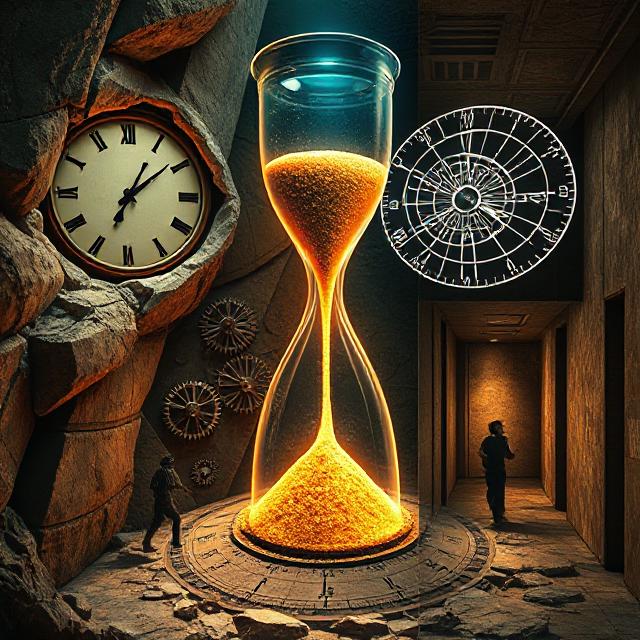
Table of Contents
Is Time Real? Or Just a Human Construct?
“Is time real?” is more than just a thought-provoking question—it’s a philosophical and scientific conundrum that has fascinated humanity for millennia. From ancient cosmologies to quantum mechanics, time remains one of the most mysterious aspects of existence. We measure it, feel it pass, and use it to structure every part of our lives. But is it an objective feature of the universe, or merely a mental framework we impose on the chaos around us?
In this exploration, we’ll trace time through the lenses of metaphysics, physics, and psychology to uncover whether time is fundamentally real or a mental abstraction.
I. The Experience of Time
Humans are uniquely attuned to the passage of time. We recall the past, anticipate the future, and live in the present. This linear, forward-moving sense of time feels undeniable. But does our experience reflect reality, or is it a subjective illusion?
- Temporal Perception: Psychological studies show that our sense of time can be distorted. Boredom stretches time, fear slows it, and attention warps it. This suggests time perception is tied to brain processes, not to time itself.
- Cultural Constructs: Not all cultures conceptualize time the same way. Western societies tend to view time as linear and quantifiable. In contrast, many Indigenous and Eastern traditions see time as cyclical or relational.
So if time feels real but varies by context, can it truly be objective?
II. Philosophical Perspectives on Time
Philosophers have long debated whether time exists independently of the mind. There are two primary theories: realism and anti-realism about time.
1. Time as Real (Temporal Realism)
This view holds that time exists independently of our minds. Events unfold in a linear sequence from past to present to future.
- A-Theory (Tensed Time): The past, present, and future are all fundamentally different. Only the present truly “exists.”
- B-Theory (Tenseless Time): All points in time are equally real. The difference between past, present, and future is just a matter of perspective.
Supporters of realism argue that time must exist because we observe change and motion. If time weren’t real, how could anything change?
2. Time as a Construct (Temporal Anti-Realism)
Some philosophers argue that time is not a fundamental property of the universe but a human-created framework.
- Immanuel Kant believed time (and space) are forms of human intuition—tools our minds use to organize experience.
- Julian Barbour suggests that time is an illusion. According to him, the universe is a series of static configurations that give the illusion of change.
III. Time in Physics: Einstein and Beyond
Physics offers powerful insights into the nature of time, often challenging our everyday intuitions.
1. Newtonian Time
In classical physics, time is absolute. It flows uniformly for all observers, like a river that carries events downstream.
2. Einstein’s Relativity
Einstein’s theories of Special and General Relativity revolutionized our understanding:
- Time is relative, not absolute. It moves slower in stronger gravitational fields and for faster-moving observers (time dilation).
- Spacetime replaces time as a separate entity. Time becomes the fourth dimension, intertwined with the three dimensions of space.
In this model, the future and past are as real as the present, echoing the B-Theory of time.
3. Quantum Mechanics and the “Problem of Time”
In quantum physics, time doesn’t always behave the way we expect:
- At the quantum level, time may be nonlinear, reversible, or even absent from certain equations.
- The search for a theory of quantum gravity (merging general relativity and quantum mechanics) has led some physicists to argue that time is emergent—a byproduct of deeper, timeless processes.
IV. Time and Consciousness
Some theories link the perception of time with consciousness itself.
- Flow of Time: Is time flowing, or is it our consciousness moving through a fixed block universe?
- Psychological Time: Neuroscience shows our brains create the sense of now, sequencing events into a coherent story.
- Eternalism vs Presentism: Eternalists believe all moments in time exist equally, while presentists believe only the present is real. Consciousness may be what singles out “now.”
These perspectives suggest that our experience of time may be deeply embedded in how our minds operate.
V. Does It Matter If Time Is Real?
Why does the question matter? The implications ripple across many domains:
- Free Will: If all moments are equally real (block universe), is the future predetermined?
- Mortality: If time is an illusion, could immortality be redefined as existing outside of temporal change?
- Ethics: A fixed universe might challenge notions of moral responsibility.
Even daily activities are shaped by our beliefs about time—from how we plan and prioritize, to how we deal with death and legacy.
VI. Conclusion: Time as Mystery and Measure
So, is time real or a human construct? Perhaps it’s both.
From a physics standpoint, time behaves strangely and may not be fundamental. From a psychological perspective, time feels indispensable. And philosophically, its status remains hotly contested.
Whether time is an objective feature of the cosmos or a clever tool our brains use to make sense of change, it remains a profound mystery. Until we solve the riddle completely, we live—paradoxically—in the flow of something we may have invented.